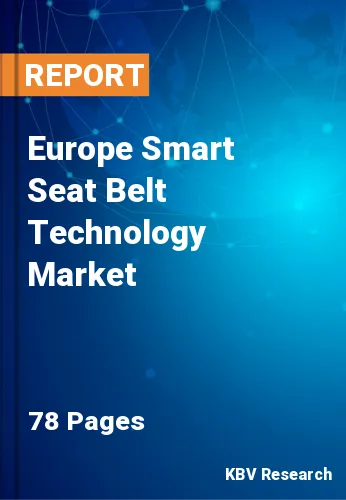The Europe Smart Seat Belt Technology Market would witness market growth of 6.0% CAGR during the forecast period (2022-2028).
Slow and deep breathing can be a sign of a relaxed resting state. The rhythm of the heartbeat, especially heart rate (HR) and heart rate variability (HRV), are strong determinants of concentration and wakefulness, while the decline in respiration rate is also proven to be strongly linked with rising fatigue in monotonous driving. The safety belt's solution idea is technologically comparable to plethysmography monitors, which are often used to assess breathing by putting pressure on a few thoracic and abdominal strips.
On the other hand, positioning the safety belt strap on the driver's chest and abdomen and applying pressure to the body are typically insufficient for physiological monitoring. So, in addition to including delicate material within the strap, the task is to modify the safety belt's construction and anchorages to better these circumstances. In order to find the best location for the sensors and create a system of tensors that would aid obtain a better handle on the placement as well as pressure of the sensor, a study of driver anthropometry is now being done.
The expansion is mostly owed to countries such as Germany, France, and the United Kingdom. Germany holds a substantial share of the market in Europe. This is due to the existence of significant automakers in this country. Seatbelt pretensioners are anticipated to see expansion in Germany, a well-known hub for the automotive sector, because vehicle production has expanded over time. Since passenger vehicle sales have climbed annually, Germany, one of the largest contributors to automotive sales, has experienced a tremendous demand growth.
The Germany market dominated the Europe Smart Seat Belt Technology Market by Country in 2021; thereby, achieving a market value of $2.1 billion by 2028. The UK market is estimated to witness a CAGR of 5.1% during (2022 - 2028). Additionally, The France market would showcase a CAGR of 6.8% during (2022 - 2028).
Based on Propulsion, the market is segmented into ICE, Electric & Hybrid, and Alternate Fuel Vehicle. Based on Sales Channel, the market is segmented into Aftermarket and Original Equipment Manufacturer. Based on Vehicle Type, the market is segmented into Passenger Vehicles, Heavy Commercial Vehicles, and Light Commercial Vehicles. Based on countries, the market is segmented into Germany, UK, France, Russia, Spain, Italy, and Rest of Europe.
Free Valuable Insights: The Global Smart Seat Belt Technology Market will Hit $27.9 Billion by 2028, at a CAGR of 6.5%
The market research report covers the analysis of key stake holders of the market. Key companies profiled in the report include Autoliv, Inc., Continental AG, Denso Corporation, Tokai Rika Co., Ltd., ZF Friedrichshafen AG, Hyundai Mobis Co., Ltd., GWR Safety Systems, ITW Automotive Products GmbH, Joyson Safety Systems Aschaffenburg GmbH, Yanfeng International Automotive Technology Co. Ltd.
By Type
By Propulsion
By Sales Channel
By Vehicle Type
By Country
Our team of dedicated experts can provide you with attractive expansion opportunities for your business.

